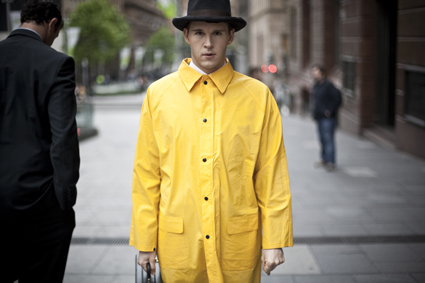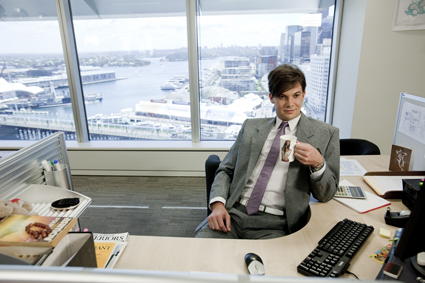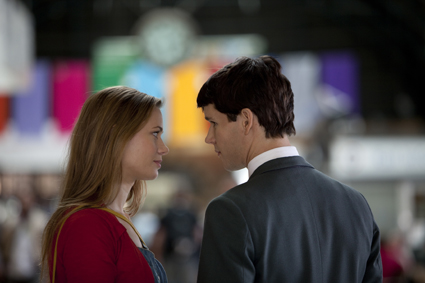a comic-romantic crusader for our times
kirsten krauth: leon ford’s feature debut, griff the invisible

Ryan Kwanten, Griff the Invisible
JAN CHAPMAN HAS A KNACK FOR FINDING RISING TALENT WHEN IT COMES TO AUSTRALIAN SCREENWRITERS AND DIRECTORS. IF HER NAME IS STAMPED ON A FILM (AS PRODUCER OR EXECUTIVE PRODUCER) IT MEANS THE FILM WILL LIKELY HAVE A UNIQUE VOICE WITH GREAT CHARACTERISATION AND WONDERFULLY STRANGE TOUCHES — LOVE SERENADE (SHIRLEY BARRETT), JANE CAMPION FILMS INCLUDING THE PIANO AND BRIGHT STAR, LANTANA (RAY LAWRENCE), SOMERSAULT (CATE SHORTLAND), SUBURBAN MAYHEM (ALICE BELL; PAUL GOLDMAN)—AND NOW HERE COMES GRIFF THE INVISIBLE FROM WRITER-DIRECTOR AND NOVELIST LEON FORD.
Recently selected for the Toronto and Berlin Film Festivals, Griff the Invisible features an Australian superhero not quite able to leap tall buildings in a single bound and who, by day, suffers bullying in the workplace while exacting revenge at night by fighting injustice in his neighbourhood.
Recent Australian film has tended to emphasise rural nostalgia (The Tree, Summer Coda, Lou, The Boys Are Back), gritty realism (Animal Kingdom) and mainstream comedy/romance (Bran Nue Dae, I Love You Too), so it’s great to see a director who’s not afraid of an experimental touch or play with genre. Leon Ford is well-known as an actor (Beneath Hill 60, Changi) while his short films Katoomba and The Mechanicals have shown a real talent for writing in particular, winning awards at the Sydney and St Kilda Film Festivals. He joins a spate of actors (Rachel Ward, Serhat Caradee, Anthony Hayes, Nash Edgerton, Matthew Newton) turning their hand to directing, with accomplished results for their first features. These directors also have a good feel for casting: Griff the Invisible goes against type with Ryan Kwanten (who does awkward as well as he does tough-guy in Red Hill and True Blood), Maeve Dermody (Beautiful Kate) as the fragile but potent Melody, and Toby Schmitz (The Pacific, Three Blind Mice and, onstage, Ruben Guthrie for Belvoir) charismatic as the arrogant bully Tony.
The film opens with a quotation from Oscar Wilde—“Give him a mask, and he will tell you the truth”—as we enter the frame of a large telescope, eyeing the cityscape, before panning around a room full of surveillance equipment on red alert for action in the streets. A woman walks, pursued by a man in a strange top hat. This is a nice parody of the big-budget blockbusters, like Superman Returns, filmed on our shores, before we’re introduced to our truly B-grade superhero in a cheap black rubber suit with a large gold G on the chest, for Griff, not Gotham.
Griff the Invisible has no superpowers that we can see but carries a blade that he swipes cartoon-style through the necks of his assailants. Kwanten has the physical ability to transform easily, moving beautifully between his alter egos. He practises his lines in front of the mirror at home—“It’s okay, you’re safe”—and searches for the right descriptor—Griff the Protector? Griff the Hidden?—as much for himself as the victims he defends.

Toby Schmitz, Griff the Invisible
By day, he is stalked by terrors even worse: the open plan office. Nervous and reluctant to engage, Griff spends his days on the phone answering client enquiries, trying not to talk to anyone at close range. Office bully Tony—a show-off in front of the ladies, a man with a strong sense of entitlement, used to getting exactly what he wants—is all too aware of Griff’s weaknesses and regularly harasses him. Ford (aided by Schmitz’s talents) cleverly chooses to portray Tony as an attractive and vivacious character (rather than the fat loser bullies often seen in US sitcoms), sexy and louche, with that right blend of menace and charm.

Maeve Dermody and Ryan Kwanten, Griff the Invisible
Griff brings his surveillance skills into the office, spying on colleagues with a series of ingeniously simple gadgets (he’s no Batman) designed to help him communicate without words. But the enigmatic narrative means that we’re never quite sure of the nature of Griff’s inner/outer world. Is it a fantasy playing in his head? Does he really hit the streets? Is he battling a mental illness in which he’s completely delusional? His girlfriend-to-be, Melody, a science student transfixed by the space between atoms, certainly believes all he says but, then again, she is the only character who can’t see him when he’s ‘invisible’ (a brilliant running gag). Getting that right balance between pathos, humour and occasional farce is extremely difficult and Ford manages it well; the film hums along with its strange dialogue, a visually inventive palette, the melancholic lead romance and real empathy for the loneliness of the central characters.
The entire plot fixes on the fight/flight response and which way Griff will turn at any moment. His life is about boundaries: who can cross them, when and where, and the possibilities of transformation. Melody, instead, wants to transcend her limitations right here right now, even attempting to walk through walls to reach Griff. With his central couple, Ford has almost effortlessly created (where films like I Love You Too and Summer Coda haven’t quite succeeded) an alluring and enduring romantic comedy, with characters complex and intertwined. It’s a strange and whimsical world for the viewer to inhabit but a terrific and courageous debut.
Griff the Invisible, writer, director Leon Ford, producer Nicole O’Donohue, executive producers Jan Chapman, Scott Meek, cinematography Simon Chapman, editor Karen Johnson, sound designer Sam Petty, production designer Sophie Nash, original music Kids At Risk; www.grifftheinvisible.com
This article was fist published online, Jan 17, 2010
RealTime issue #101 Feb-March 2011 pg. web






